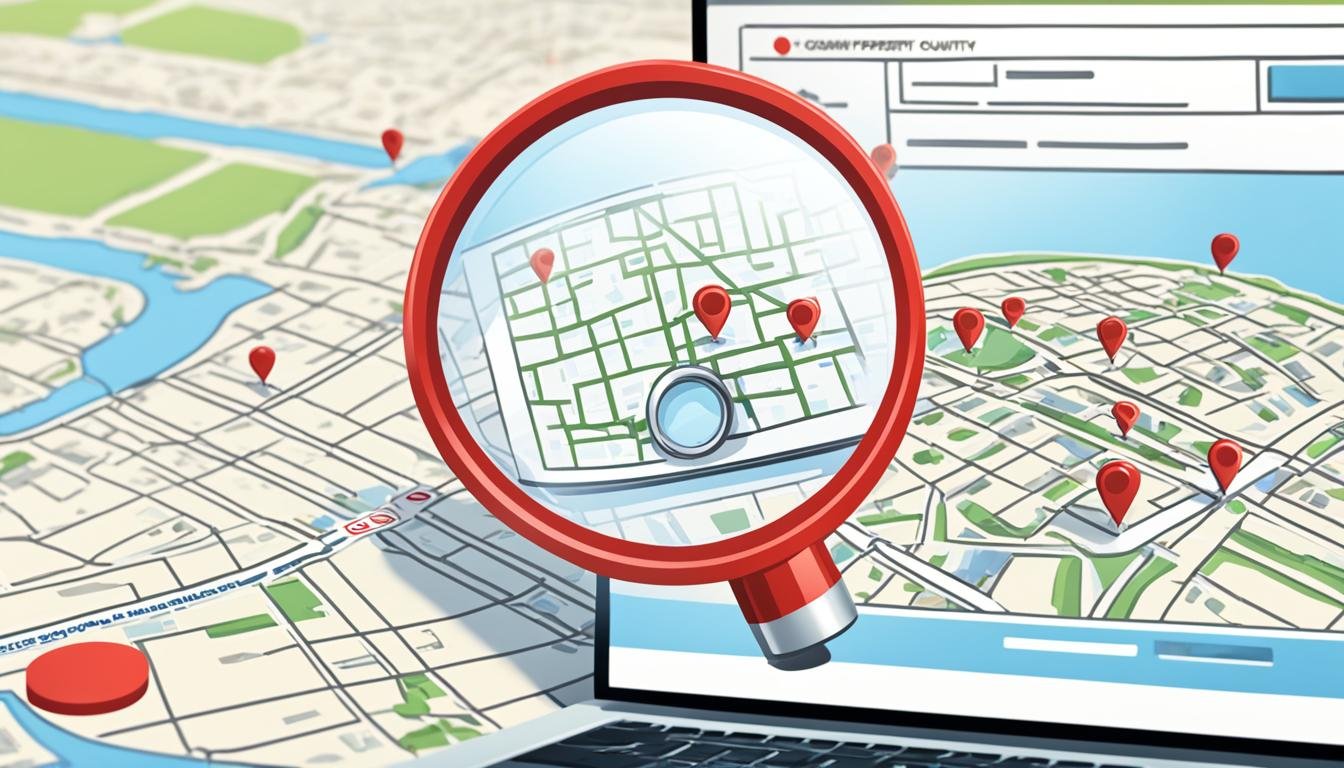Have you ever thought about what happens if you don’t pay your property taxes? A tax lien could be hidden, putting your ownership and money in danger. You should avoid being surprised by finding out if there’s any tax liens on your property.
Key Takeaways
- Tax liens can stop you from getting all the money when selling your home or refinancing it.1
- Things like liens can show up on your credit report and lower your credit score.1
- Getting help from a title search company is often the best way to check for liens.1
- If you don’t pay your property taxes, Tax authorities can put a lien on your house.1
- The IRS might put a federal tax lien on your real estate if you don’t pay serious tax debt.1
Figuring out if there’s a hidden tax lien can seem hard. But, this easy guide will show you step-by-step how to do it. You’ll soon know how to protect your property and money.
Understanding Tax Liens
A tax lien happens when you owe taxes and don’t pay them.2 It’s a way for the government to make sure you pay what you owe. Not paying taxes can lead to them taking and selling your stuff. This is to cover the unpaid taxes.
What is a Tax Lien?
Tax liens can happen at the federal level or by state and local authorities.2 When taxes are not paid, the government tells everyone with a public document. This document is called a Notice of Federal Tax Lien or a state/local tax lien. It shows the government has a right to your property, like your home, things you own, and money.2
Types of Tax Liens
There are two main types of tax liens:
- Federal Tax Liens: These are from the IRS for not paying federal taxes. This includes income tax, payroll tax, or estate tax. They affect all your current and future things. This might make it hard to get credit or sell things.2
- State and Local Tax Liens: These are from your state or local tax offices. They happen when you don’t pay property taxes, sales tax, or other local taxes. These debts are tied to certain properties.2
Consequences of Unpaid Taxes
Not paying taxes can lead to big problems. The government can do more if you still don’t pay, like:
- Sell your stuff to pay off the debt (called a tax levy).2
- Take money from your pay or bank to pay the owed taxes.2
- Stop you from getting a new passport or renewing your current one. This is if you owe a lot in taxes.2
Dealing with tax liens quickly is very important. It can keep you from losing more and facing extra fees. The IRS has special teams to help with questions about tax liens.2
| Tax Lien Consequences | Impact |
|---|---|
| Property Seizure | The government can seize and sell your property to satisfy the tax debt. |
| Wage Garnishment | Your wages or bank accounts may be garnished to collect unpaid taxes. |
| Credit Implications | A tax lien can negatively impact your credit score and ability to obtain loans or credit.2 |
| Business Impact | Liens can extend to business property and rights, including accounts receivable, hampering operations.2 |
Why Search for Tax Liens?
Looking into tax liens is important for both real estate transactions and business partnerships. They show there may be unpaid tax debts.3
Due Diligence in Real Estate Transactions
Buying property means making sure there are no tax liens on it. These liens let the government claim the property if the taxes are not paid. This can affect its value and change of ownership.3 Checking for tax liens helps you understand the financial risks. This way, you can decide wisely.
Risk Assessment for Business Partnerships
Checking for tax liens is key when looking at business partners or deals. A tax lien on a business might mean it’s struggling financially or poorly managed. This could hurt how well the business runs or if it meets its duties.3 Finding these tax liens early helps you see the risks. It helps you check if working together matches your investment goals and how much risk you’re okay with.
Tax liens could also point to larger issues within a company, like bad bookkeeping or not following the rules. A deep look at tax liens can show these signs. Then, you can make choices that avoid future problems.3
| Type of Tax Lien | Description | Precedence |
|---|---|---|
| Federal Tax Lien | Filed by the IRS for unpaid federal taxes | Takes legal precedence over other creditors3 |
| State Tax Lien | Filed by state governments for unpaid state taxes | Some state tax liens take precedence3 |
| County Tax Lien | Filed by county authorities for unpaid property taxes | Follows state regulations and can vary3 |
Exploring tax liens from places like county tax assessor records, state lien registries, and public tax lien auctions is very enlightening. This research can help you understand the financial health of an investment or partnership. Knowing this information lets you make smart decisions, lower risks, and safeguard your interests in the future.24
How to Find a Tax Lien on a Property
Finding out about a tax lien is key when looking into a property. Tax liens show a property owes delinquent taxes or other payments. The government has a right to the property until these debts are settled.2
Searching County Tax Assessor Records
Check the county tax assessor’s office first. They keep property tax records and any filed liens. You can look up the property’s address or owner’s name in their online or in-person records.2
Utilizing State Lien Registries
States have places online where you can look up property liens. This covers tax liens and other lien types. You can search by property address or owner details. This makes it easy to check all over a state.5

Remember, the way you search for tax liens might change from place to place. Always learn how to do it the right way in your area.
| Type of Lien | Filing Authority | Search Method |
|---|---|---|
| Federal Tax Lien | Internal Revenue Service (IRS) | Freedom of Information Act Request, Automated Lien System |
| State Tax Lien | State Tax Agency | State Lien Registry, County Recorder’s Office |
| Local Tax Lien | County or Municipal Tax Collector | County Tax Assessor Records, Local Government Databases |
Searching all the right places lets you see all tax liens. This helps you buy safely and avoid surprises. Starting deal with tax liens early saves you trouble.6
Federal Tax Lien Searches
To find a federal tax lien on a property, start at the IRS’s Automated Lien System (ALS).2 This system has records of all IRS federal tax liens.2 To use it, you must send a FOIA request to the IRS.7
IRS Automated Lien System
The Automated Lien System is where the IRS keeps federal tax lien info. It shows the liens for late taxes on people or businesses.2 You can find the taxpayer’s name, lien amount, and the thing the IRS has claimed.2
Freedom of Information Act Requests
For searching the Automated Lien System, you need to ask using FOIA with the IRS.7 This way, anyone can get federal records, like tax liens. When asking for tax lien info, give clear details on the property or taxpayer.2
Searching with FOIA can give you a lot about tax liens, but it takes time.7 So, some prefer using third parties. They gather data from different sources to make finding a tax lien easier.7
Third-Party Lien Search Services
In today’s world, checking things well is very important for businesses. This is true when looking into how to find a tax lien on a property. Luckily, third-party lien search services now help. They gather data about liens from many places and put it in one easy-to-search database.7
These services make it easier to find property tax records and see tax lien certificates. They also show the risks tied to properties or people. Businesses can see UCC, federal, and state tax liens all in one place. This helps them make smart choices and avoid debts, assets issues, and money troubles.7
Using automated third-party lien search services like Middesk is fast. It helps check government details better. This makes it easier for businesses to know about the risks. These services let businesses look for liens in different ways, meeting many needs.7
Looking at UCC and federal/state tax liens is key for safer business deals.7
If someone is thinking about tax lien investing or checking public tax lien auctions, these services are a must. They share a lot of information. This includes details about debtors, creditors, what’s used as security, and when and where the filing happened.7
| Lien Search Type | Description | Importance |
|---|---|---|
| UCC Lien Search | Reveals legal notices from private creditors against businesses | Analyzes claims against a company’s assets |
| Federal Tax Lien Search | Identifies IRS claims on assets due to unpaid federal taxes | Assesses federal tax liabilities impacting business operations |
| State Tax Lien Search | Shows state government liens for unpaid state taxes | Evaluates state tax obligations and potential property seizures |
By using third-party lien search services, companies can deal with the details of county tax assessor info and liens well. This way, they get a full picture of risks and duties tied to properties or business partners.3
Understanding Tax Lien Certificates
A tax lien certificate is a note from the government on a property. It happens when the owner doesn’t pay taxes.8 These notes are sold at public tax lien auctions for investors to buy. They can make money from them through interest.
What is a Tax Lien Certificate?
When taxes aren’t paid, a lien is put on the property. Instead of taking the property, some places sell these liens to investors. They sell it through tax lien certificates. Holders of these certificates can earn interest on the debt until it’s paid back.
Purchasing Tax Lien Certificates
At auctions, investors buy tax lien certificates. This can be in person or online. How you win varies, like bidding the most interest or least rate. If you win, you must pay the total taxes soon, like in one to three days.
Risks Involved in Tax Lien Investing
Though profitable, tax lien investing is risky. You can’t easily sell tax lien certificates like stocks. If the owner doesn’t pay back within a set time, the investor might need to foreclose the property. This can be expensive. Doing careful research before investing can help avoid these problems.
Redeeming Tax Liens
If people don’t pay their taxes, the government puts a tax lien on their property. This is a way to collect the delinquent taxes. But, owners can take steps to get rid of these liens.
Paying Off Tax Debt
To get rid of a tax lien, just pay all the delinquent taxes in full. Don’t forget the interest and fees too. Once everything is paid, the lien is taken off and the property is clear again.49
Negotiating Installment Plans
Sometimes, the tax department will let you make a payment plan. This allows you to pay your taxes back bit by bit usually over a few months. If you stick to the plan, the tax lien will be removed once you’ve paid it all.10
It’s very important to act fast and look at all your options to fix your tax lien. If you don’t, worse things could happen. The government might sell the tax lien certificates or try to take your property.4910
Tax Lien Foreclosures
If you can’t pay a tax lien on your home in time, the holder can start foreclosure proceedings. This forces you to sell your home to cover the delinquent taxes.1112 There’s only a short time to fight this or pay off the lien.
Foreclosure Process
Losing your home because of tax liens happens fast, maybe in six months.11 But some states, like New York, give more time. They might let you have three to four years to catch up before starting the foreclosure.11
Redemption Periods
You might get up to three years in New York to pay the taxes and fees to fix the tax lien issue.11 How long you have depends on the state, from three months to three years.12
Contesting Tax Lien Foreclosures
If you might lose your home to tax lien, you could try to question the tax amount or make a deal. A 25% down payment might keep you from losing your home.11 In some cases, Chapter 13 bankruptcy helps. It can protect you and let you pay off the taxes in five years.11
| State | Redemption Period | Tax Lien Sale Method |
|---|---|---|
| New York | Up to 3 years for residential properties | Counties sell liens to third-party investors or trusts |
| Arizona | Up to 3 years | Investors can earn up to 16% interest on certificates |
| California | 5 years | State-managed lien and foreclosure process |
State-Specific Tax Lien Laws
The rules about tax liens on properties are different in each state.133 For example, New York sells some tax liens to private trusts. But, California and Texas use state-run systems for liens and foreclosures.
New York Tax Lien Procedures
New York lets the state and local governments sell tax liens at auctions.14 These liens are sold to private trusts. Then, they can collect the overdue taxes from property owners.
California Tax Lien Procedures
In California, state and county tax collectors look after tax liens.3 They put liens on properties with unpaid taxes. If taxes aren’t paid, the county can take the property.

Texas Tax Lien Procedures
Like California, Texas also has the state and county administers handle liens.14 If taxes are not paid, the county can sale the property at a public tax lien auction.
It’s important to know your state’s tax lien rules if you’re dealing with late taxes or want to buy a property tax lien certificate.13 Asking local experts or lawyers can help you understand these laws better.
| State | Tax Lien Handling | Potential Consequences |
|---|---|---|
| New York | Tax liens sold to private trusts at auctions | Property owners must deal with private lien holders for redemption |
| California | State and county authorities manage liens and foreclosures | Properties can be seized and sold by the county to recover taxes |
| Texas | County tax assessor-collectors handle liens and foreclosures | Properties can be sold at public tax lien auctions if taxes remain unpaid |
Conclusion
When dealing with real estate and business, doing due diligence is vital. This helps lower risks and make smart choices. One key part is to find tax liens on properties. This can show you if a property has money troubles or good chances15. You do this by looking at public records from tax offices or state registries.
Knowing about tax lien certificates, redeeming tax liens, and tax lien investing is important. It helps you move carefully in this area. This is useful for both property owners wanting to pay old taxes and investors looking at the tax lien market15. It’s also good to know the risks, like tax lien foreclosures, to protect yourself.
Learning about tax liens can be a big help in your choices. By looking at lots of details, checking public files, and using good outside help, you’ll understand a property’s money situation better. This makes buying or partnering in real estate or business less scary and more clear1516.
Thank you for reading! Stay updated with the latest insights from Junk Home Buyer.
Source Links
- https://www.forbes.com/advisor/mortgages/check-liens-on-property/
- https://www.irs.gov/businesses/small-businesses-self-employed/understanding-a-federal-tax-lien
- https://www.wolterskluwer.com/en/expert-insights/state-tax-lien-search
- https://www.investopedia.com/articles/investing/061313/investing-property-tax-liens.asp
- https://www.tax.ny.gov/enforcement/collections/tax-warrants.htm
- https://www.nyc.gov/site/finance/property/property-lien-sales.page
- https://www.middesk.com/blog/ucc-lien-search
- https://www.investopedia.com/terms/t/taxliencertificate.asp
- https://www.quickenloans.com/learn/buying-tax-lien-properties
- https://www.rocketmortgage.com/learn/tax-lien-investing
- https://www.ny-bankruptcy.com/what-is-a-tax-lien-sale-in-new-york-state-whats-tax-lien-foreclosure-in-new-york
- https://www.investopedia.com/terms/t/tax-lien-foreclosure.asp
- https://www.dor.ms.gov/news/state-tax-lien-registry
- https://www.thetaxdefenders.com/what-is-a-state-tax-lien/
- https://www.dealmachine.com/blog/property-tax-liens
- https://www.occompt.com/Faq.aspx?QID=122

